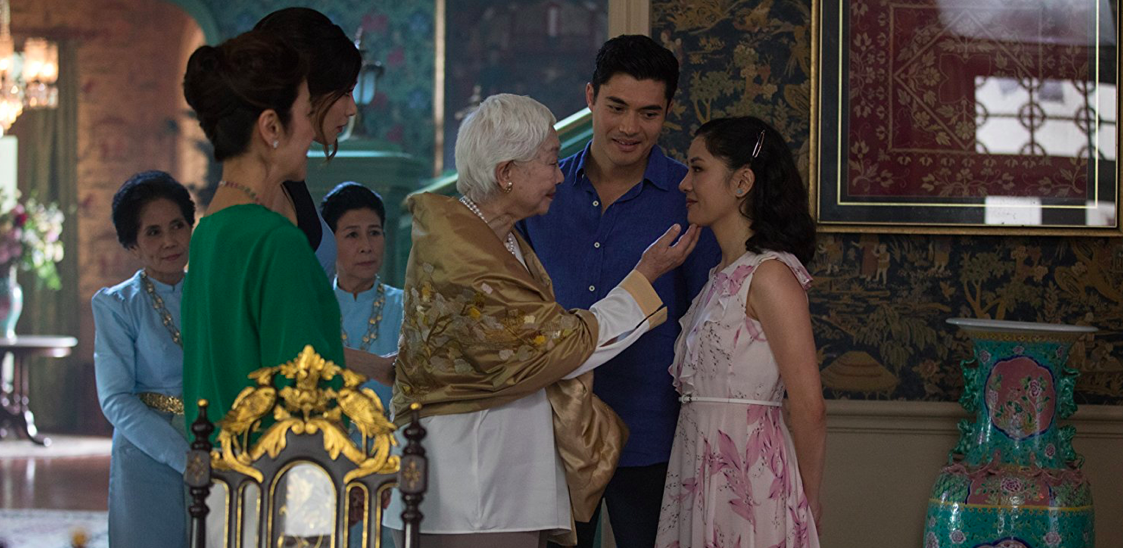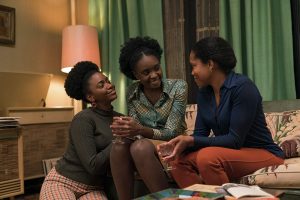There is a scene in Crazy Rich Asians—the highly anticipated film directed by John Chu—where several branches of the Young family tree sit around a table performing a classic Chinese activity: making dumplings. As leading man Nicholas Young (Henry Golding) teaches his girlfriend Rachel Chu (Constance Wu) how to fold the dough, the group begins to reminisce about how they learned to make dumplings in their childhood. As Nick’s stern mother Eleanor Young (Michelle Yeong) stares on disapprovingly, her own mother enters the room, only to tell Eleanor she’s lost her touch. This scene is the epitome of Crazy Rich Asians: a film that tackles the balance between preserving tradition and pursuing one’s passion.
Based on the best-selling book by Kevin Kwan, Crazy Rich Asians has garnered widespread attention for being the first Hollywood film with an all-Asian cast that has featured Asian-American leads since The Joy Luck Club 25 years ago. Including Golding, Wu, Awkwafina, Yeoh, and Ken Jeong among others, this milestone can’t be understated for the future of Asian actors, directors, and producers in Hollywood. It’s deeply satisfying—and long overdue—to see Asian actors playing a wide span of roles (the leading couple, the gregarious best friend, the stern mother, and the ridiculous party goers, to name a few) instead of being relegated to the quirky sidekick.
Despite its role in putting Asian and Asian-American actors on a big stage, Crazy Rich Asians falters in its lack of representation of other Asian minorities in Singapore. While the film shouldn’t be expected to encapsulate every Asian or Asian-American experience, it’s been criticized for excluding the 15% of Singapore who are Malay and the 6.6% who are Indian, choosing instead to focus on East Asian and lighter-skinned identities.
The plotline of Crazy Rich Asians is a familiar one. In a classic rom-com setup, Nick brings his girlfriend, Rachel, home to Singapore to attend his best friend’s wedding. Once there, Rachel is unexpectedly dropped into the middle of one of Asia’s oldest and wealthiest families, with Nick at the center of the action. It’s a far cry from her job as a professor at NYU; here, status means everything and nothing is private. Rachel is forced to navigate this new world, with Nick’s stern mother Eleanor as her main opponent.
Nick and Rachel share plenty of heartfelt moments, and the future of their relationship looms large throughout the film. But where the film really shines—beyond the millions of dollars’ worth of jewels—is in its nuanced portrayal of motherhood and family. Yeong is superb as Eleanor, the stoic head of household who keeps the Young family together. And while she is disapproving at best and cruel at worst to Rachel, she also reveals moments of vulnerability. Powerful interactions between Eleanor and Rachel raise intergenerational questions of loyalty, sacrifice, and passion—ones that far outweigh your classic boy meets girl tale.
Crazy Rich Asians excels when it comes to bringing viewers directly into the landscape of Singapore’s elite families. Text messages dance across the screen as news spreads of Nick’s impending visit to Singapore, highlighting his position as a pseudo-celebrity. Once the couple arrives, viewers are whisked between scene after scene of luxurious mansions, private jets, boat parties, and colorful lights. Nick’s best friend’s wedding is the main event of the film, and it doesn’t disappoint. A church is transformed into a nature oasis with lush greenery, and water slowly seeps down the aisle before the bride—covered in glitter from head to toe, of course—steps out. As Peik-Lin, Awkwafina provides much of the comic relief. She totes Nick as the Asian bachelor and balances out the film’s toughest moments with good-natured one-liners. Every scene is punctuated with upbeat Asian music, including Chinese covers of Madonna and Coldplay. There’s no doubt that Crazy Rich Asians is damn good fun.
Where the film falls short is in some of its more cringeworthy moments. When Rachel visits best friend Peik Lin’s house for the first time, Peik Lin’s father tries to egg his son on to date a girl like Rachel, and so, the awkward younger brother snaps pictures of her at the kitchen table. The interaction misses the mark as comic relief, instead feeling intrusive and unnecessary. Similarly, during a bachelor party, Nick’s childhood schoolmates make a couple of crude comments about Rachel. As one-dimensional characters, the moment comes across as a cheap way to establish conflict.
In addition to a few off-color moments, Crazy Rich Asians occasionally tries to tackle too much. Kwan’s novel covers the intricacies of Nick’s complicated family tree, each chapter taking the place of a different person’s point of view. Transferred onto the big screen, the film attempts to keep up as it whizzes quickly between a few different characters’ plotlines. Without the context of the book, at times the storylines can feel muddled, resulting in some plot holes.
Despite these flaws, Crazy Rich Asians proves itself as a fast-paced rom-com that successfully immerses readers in the world of Singapore’s elite, but also manages to depict some more relatable themes. In what is one of the most poignant moments of the film, Rachel and Eleanor confront each other while playing mah-jong. As the pair expertly slide tiles across the board, the tensions between passion and tradition and familial loyalty and love are more salient than ever: Crazy Rich Asians’ full emotional impact is on display.





